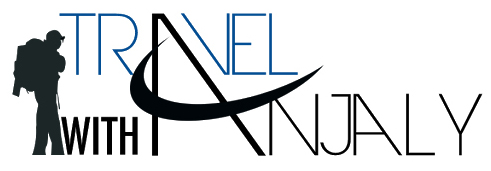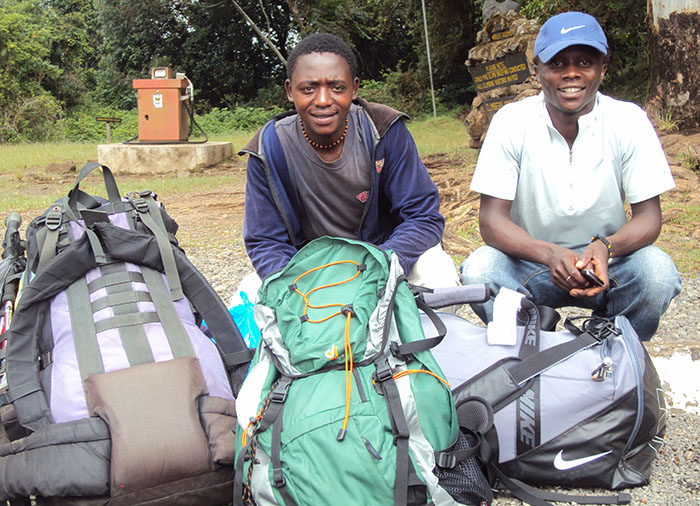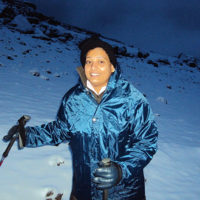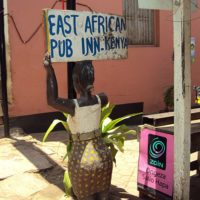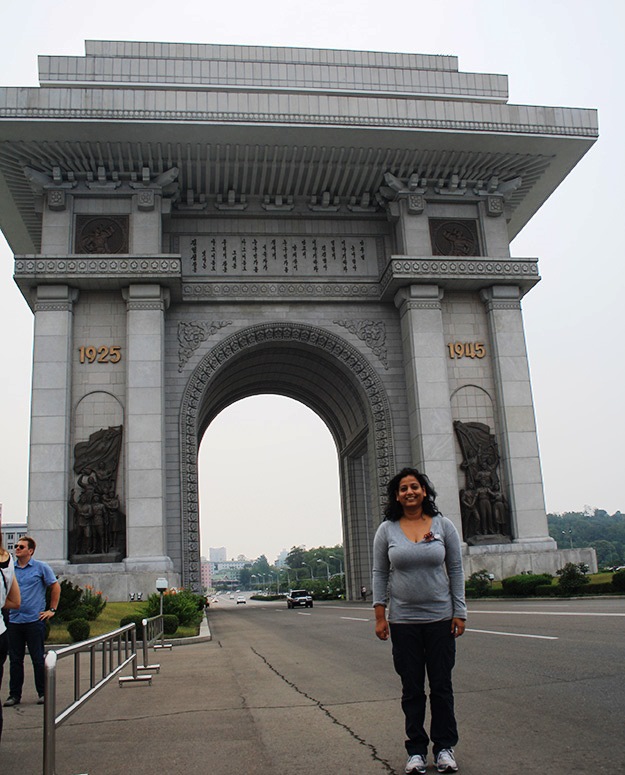March 26, 2010
We wake up early, eat a light breakfast, and hurry downhill in order to be out of the park area. Walking downhill is not so hard and before we know it, we have arrived at the exit gate. I wait in the waiting area while Siraji leaves to fetch my climbers certificate. This is a big moment for me and I am excited that my name will go down into a book of successful climbers that have stood on Uhuru Peak.
Siraji comes back with my certificate beaming.
“Congratulations. I am so proud of you.”
I glance at the certificate and freeze. The summit date is wrong. They have missed it by a day. Siraji assures me that it happens all the time. “No matter,” he says calmly. “You don’t worry.”
Meanwhile the porters bring in my luggage. They will leave us here. From here on it is Siraji and I. With a tinge of melancholy that comes at the end of a great trip and bonding, I smile at them fondly. They have been fabulous these last five days. It is only fair that I tip them, they have earned it. I pull the duffel bag towards me and stare in horror. The lock is broken. I know what I am going to find and correctly, my fears have come true.
The money has vanished. The broken lock speaks for itself.
Siraji appears in response to my urgent summons, quickly inspects the lock and makes a decision.
Lucas, he says. It has to be Lucas.
The porters are exonerated. Siraji leaves to bring Lucas in for questioning. Suddenly all the excitement is gone to be replaced by a certain cold harsh truth.
Someone in my group of four is a thief.
The porters will go without a tip. It is unfortunate but there is nothing I can do.
Lucas appears before us. Siraji takes charge and rapid Swihili is exchanged. Lucas, I can tell is denying everything. I catch the words police from time to time. Must it come to that?
Siraji decides we must go to the police. I am too exhausted to argue.
We ride back to town in silence, everything is a blur. I try talking to Lucas kindly in the hope that he will admit his mistake so we can part on happy terms. He doesn’t budge.
We arrive at the Moshi police station and go straight to the station in charge. As mzungu, I do not have to wait in line. There are a lot of people waiting in the dingy room.
I do not want to be here, testifying against someone I have spent the last five days of my life climbing a mountain with, for a mere three hundred dollars. I want to get out of here as fast as I can. Siraji insists that Lucas must be taught a lesson.
“He gives us porters a bad name. This is not good for our country. He is a thief.”
A beady eyed inspector walks up to me. Siraji explains the situation. The bag with the broken lock is produced. I merely nod my head in the affirmative. Lucas is brought in. He continues to deny. The inspector’s patience is running low. He has, I can see, far too many people to deal with.
He barks orders to someone in the back. Lucas’s bag is handed over to Siraji to “search at will”. A burly black man takes Lucas by his elbow and pushes him through the door that is already packed with offenders.
“They will make him admit it. Maybe he will stay one week inside. He must not do it again.”
The cell door shuts. From behind the bars, Lucas stares at me.
Why? What did I ever do to you? I carried you when you were tired. I rejoiced in your victory. In five days, we became friends. I adored you. You cried on my shoulders. You laughed with me. Yet, I am here and you are the reason. What did I ever do to you?
I turn to leave. The officer stops me.
“Madam, you are sure it is him? Sure that no one else could do this this? Your guide, maybe?”
“Yes.”
Is the officer trying to tell me something? Does Lucas deserve the benefit of doubt?
And suddenly I am not sure Lucas is the reason for the missing $300. It could be anyone at all – even Siraji or the two other shadowy porters whose names I don’t remember. Why did I exonerate Siraji? I wish it isn’t.
Siraji is my guide turned friend. Lover. He wouldn’t do this to me, surely?
Lucas is the one.
“Only he had the chance. See? The lock on my bag is broken. It wasn’t when we started,” I reply flatly.
That much I am sure of. Only Lucas had the chance.
Siraji follows me out with Lucas’s backpack. We are permitted the custody of it till he “admits” to the crime. In Tanzania, the verdict is always in favour of mzungu. I am not sure what it says of the legal system but this is the way it works. The word of mzungu over everything.
I am beginning to dislike the place altogether. When we make our way to Hotel Kindoroko, it is raining like never before.
“He hasn’t had the chance to move the money. Maybe it is still in his bag,” Siraji offers helpfully.
“Yeah, maybe.”
I don’t care anymore. I wish the rain to stop for it makes me feel gloomy and damp, the kind that clutches your heart and squeezes every bit of enthusiasm. The ecstasy of summiting Africa’s tallest mountain is gone and driven home the truth of Lucas’s betrayal.
The faith -bubble popped. This is the reality of Tanzania.
At Hotel Kindoroko is alive when we walk through the lobby and collapse on the wooden bench. The vicious wooden crocodile gapes at me lifelessly. Jenna is happy to see me. I show her my certificate that has the wrong summit date, but it matters little to her.
“You look fantastic, even better than when you left,” she says. I smile flatly. I feel different, empty and depressed. I want to sleep. Maybe things will be different when I wake up?
Jenna, in an energetic display of emotion punches me in the stomach, thumps my chest and sends for coffee before suggesting a place nearby that will braid my hair for free.
“For climbers,” she says, conferring upon me a title I have taken five days to earn.
Siraji explains the situation with Lucas and the expressions quickly changed to sympathy. Really, I can survive the loss of money but Siraji is unstoppable. What I don’t know is that to the Tanzanians, it is a matter of honour. They cheer me for reporting Lucas, a mere porter who gives them a bad name.
Thus Lucas becomes a thief without standing trail.
Lucas definitely had the opportunity, but did he have the motive? He is a porter – a mere nobody, but does that make him a thief? I throw the contents of his backpack on the floor. Everything is tattered and damp. Half-bottles of jam, sauces and milk powder sat on the bottom, unaffected. I had given him all that, before I had discovered the loss. His frayed fleece jacket is damp. I run my hands through every pocket, hoping to find something nailing him to the crime.
There is no money. But in one of the pockets I find a Swiss Army knife.
My Swiss Army knife.
I lay down, absently playing with the knife, mulling over the last five days. Everything feels strange. Different. Even the knife doesn’t really feel mine. The familiarity, the pride of ownership is gone. I no expert at identifying Swiss knives, but the one in my hands somehow feels different. Is it really mine? Mine had the tweezers, yes, the toothpick, the bottle opener, the blade – but did it also have scissors and a corkscrew?
I couldn’t be sure. But finding it nails Lucas to the crime. On my charge, Lucas will lose his license as a KINAPA porter.
I must have fallen asleep then because when I wake up it is still raining. The temperature has dipped. I have just enough time to get dressed before Siraji arrives to take me back to the police station.
I dread the thought of having a conversation with the officer that will inevitably begin with an -“Are you sure it was him?”
I wonder if I can make my charge stick. The money is not in the backpack, a knife is. Will that help? It is the only incriminating evidence. Lucas had been with us all the while since my descent – where had the money gone? The authorities can deal with them in any way they pleased. I don’t want the money or the knife.
I want to forget this happened.
I dig into my bag for a sweater. My fingers close around something hard and cylindrical. A stick of lip balm? Hardly likely. A torch?
It is my Victorinox Swiss Army knife – the one without the scissors and the corkscrew.
Through the sheet of rain, the police station looks intimidating. I march in. As a mzungu I have the privilege of not waiting in line. I am relieved to see it is the same officer on duty. Siraji follows me. He is not happy at what I am going to do.
“Let him go. I am not going to press any charges against him. Please, let him go.”
“Did you find the money?” he calls out cheerfully.
“No. And really, I don’t care.”
“You are a tourist,” he launches into his official voice. “You spend a lot of money to come to my country. We will make him admit it.”
“No. I don’t want the money. Just let him go.”
I cannot bring myself to tell him that the knife proves his innocence.
“Are you sure?”
“Yes…no…but it doesn’t matter. Let him go.”
He shrug his shoulder elaborately conveying in that simple movement what he thought of mzungus in general and signaled me to follow him to the cell. A sea of faces appears behind the bars, all similar in appearance and expressions. It is dark and musty. The atmosphere is wrong. I shiver and I know it is not the cold causing it. Looking the prisoners in the eye is unnerving. I cannot read anything in those eyes looking at me..
Suddenly he appears in front of my eyes on the other side, gripping the bars tightly. He looks tired. When he smiles I can see his bleached white teeth and shockingly pink gums. I focus on his eyes – the eyes of an innocent man. In them is hope.
I knew you would come, it says.
I want to be alone. Siraji is not happy at the outcome. Maybe he has begun to feel that Lucas’s innocence ironically puts him in the dock. I am uncertain who to trust. My heart says it is not Lucas. I refuse to accept the truth is beginning to dawn on me.
I return to my hotel for a nap. Siraji will arrive in a couple of hours and we will go for our celebratory dinner somewhere nice. I must be careful what I tell him, for I have a feeling that something about what I said to him on the slopes of Mt Kilimanjaro will come back and bite me in the ass.
Or even what I did. Correction. What we did.
I confess. I had, in an advanced state of delirium, somewhere between the alpine desert of The Saddle and the crumbling stones of Kibo Hut two days ago, made some silly remark about how much I loved Tanzania and its people with specific allusion to Siraji. After all I was wearing his clothes and that is enough to create a certain affinity towards the person, you agree. As a result of this lightheadedness, I promised him a world that primarily consisted of me. He had taken it seriously.
Siraji arrives on time as usual. He has changed much in the last two hours. His eyes are sparkling. A shower has done him good. He looks rather attractive in jeans. The tattoo is partly visible on his upper arm and he smells of cologne.
I suggest a cup of coffee. I need something hot and strong to keep me focused. A lot has happened. On one side is the attentive and love-stuck Siraji and on one side is my nagging doubt about his innocence. I hope it doesn’t show in my attitude towards him. I am torn between asking him and letting it pass. I am caught up in a maze of emotions.
I anticipate that Siraji will put forward his case. There is a slight drizzle and we walk rapidly towards the coffee shop. I cannot bear the noise and chaos of Moshi anymore. Boda bodas whizz past mercilessly and I want to be back on the mountain, just him and I, sharing nothing but silence and labored breaths and looking forward to summiting a mountain together. I feel growing warmth towards him, but I really must not lose my head right now. I shiver at the thought of confronting him with the truth, if it comes to that. The idea of being wed to a climber had seemed romantic at an altitude of 4000m AMSL, but my outlook had undergone rapid changes as we descended.
Now, it is altogether dead. I am afraid I am being very selfish.
Over coffee Siraji makes his intentions clear.
“I want to marry you.”
“Oh Siraji, I know you do. I know. But, is that even possible? I have to go back home.”
Then I tell him, without mincing words, that I am taken, which is a lie, and that marrying a wanderer such as I will do not good to a homely, dedicated man such as him. Siraji doesn’t agree but he realizes that a marriage is impossible right away but agrees to rethink this proposal at a later date.
I do not know how to make things better so I suggest going for a walk before dinner. We walk aimlessly, avoiding puddles and bike taxis, speaking very little, absorbed in our own thoughts. Occasionally I steal glances at him. I am enjoying the moment immensely – the bittersweet pain of rejection combined with the sweet taste of success owing largely to the man walking beside me in the gathering darkness. There is a promise of rain. The noise on the street is deafening but I feel as though I have always belonged here, in Moshi, in Africa. With Siraji.
I owe Tanzania an apology but I have a question on mind. If not Lucas, then who?
Is it possible that Siraji will stay the night with me despite what has happened? I would like him around me – at present he is the only person in the world who shares my present.
We arrive at a restaurant named Fish Coach but which has more meat on its menu than fish. I try to place an order in Swahili.
“Jambo. Wali kuku, nyama choma and chipsi. Siraji, right? Ugali and Sukuma wiki.”
“You are learning very fast,” says Siraji, his smile returning. “You will eat all this?”
“I’ll try. I want to try everything, maybe not fish. We should eat pilau next.”
Dinner ends happily and we take our leftover food which Siraji says we can give to someone. There is a lot left. I am thinking of the security guard at my hotel. Perhaps he would appreciate it?
Siraji agrees to show me around Moshi tomorrow. I want to ride a boda-boda. I want to hear the drumbeats of Africa. I want to hear the lions roar…but I must wait. I have fulfilled the dream that brought me to the continent of Africa and I am proud of myself. Starting tomorrow I am going to immerse myself in the reality of Africa. I go to sleep wondering what stopped me from asking him to stay with me. But I know the answer.
